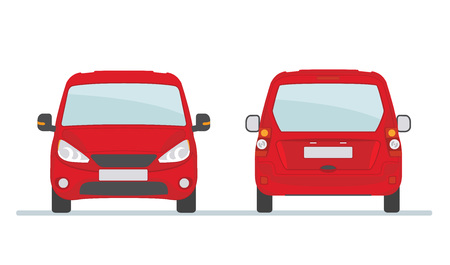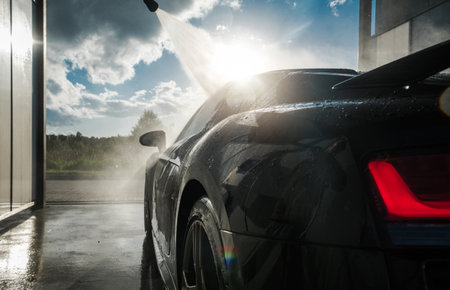1. Introduction to the British Hatchback Scene
If there’s one car style that truly captures the heart of Britain, it’s the humble hatchback. From bustling city streets in London and Manchester to winding B-roads cutting through the Lake District or the Scottish Highlands, hatchbacks are a quintessential part of UK motoring culture. Their compact dimensions make them perfect for navigating narrow village lanes and squeezing into tight parallel parking spots outside your favourite chippy, while their surprisingly roomy interiors offer enough space for a weekend’s worth of camping kit or surfboards bound for Cornwall.
The British have long favoured practicality over ostentation when it comes to cars—after all, we’re a nation that loves a good road trip as much as an efficient commute. Hatchbacks tick both boxes with their legendary versatility and economical running costs. Whether you’re popping down to Tesco, heading off for a wild camping adventure in Wales, or embarking on a self-drive holiday across the Yorkshire Dales, these cars fit right in with our sense of freedom and love for the open road.
Let’s not forget: the UK is full of charming yet challenging roads, from cobbled city centres to muddy lay-bys on the edge of remote national parks. The hatchback’s agile handling and modest footprint are simply made for such varied terrain. It’s no wonder that models like the Ford Fiesta, Volkswagen Golf, and Vauxhall Corsa have become fixtures in British driveways.
But with so many powertrain options now available—petrol, diesel, hybrid, and electric—the question remains: which hatchback truly suits the modern British lifestyle? In this showdown, we’ll compare each type not only by numbers but also by how they cater to our unique blend of urban living and countryside escapes.
| Key Hatchback Advantages | Why Brits Love Them |
|---|---|
| Compact Size | Perfect for city driving and parking |
| Flexible Interior Space | Great for camping gear or family trips |
| Fuel Efficiency | Keeps running costs down on long journeys |
| Agile Handling | Ideal for twisty rural roads and country lanes |
| Affordable Ownership | Suits budget-conscious drivers across the UK |
This guide will help you navigate the choices—from petrol nostalgia to electric innovation—and pick the hatchback that fits your British adventures best.
Petrol Hatchbacks: Classic Choice for British Roads
When it comes to hatchbacks in Britain, petrol models have long held a special place in the hearts of drivers. Their enduring popularity stems from a blend of practical benefits and the way they fit into the rhythm of everyday British life. Let’s take a closer look at what makes petrol hatchbacks a go-to option, especially for those who love spontaneous road trips through rolling countryside or quick dashes between city centres.
Running Costs: Affordable and Predictable
One of the main appeals of petrol hatchbacks is their relatively low upfront price compared to hybrids or electrics. Maintenance tends to be straightforward, with parts and servicing widely available at reasonable rates—a big plus when planning longer journeys across the UK’s diverse landscapes. While fuel prices can fluctuate, many drivers find the predictability of running costs reassuring.
Cost Comparison: Typical Annual Expenses
| Expense | Petrol Hatchback | Diesel Hatchback | Hybrid Hatchback | Electric Hatchback |
|---|---|---|---|---|
| Average Fuel/Charging (£/year) | £1,200 | £1,000 | £900 | £400 |
| Servicing & Maintenance (£/year) | £250 | £300 | £220 | £140 |
| Total Typical Cost (£/year) | £1,450 | £1,300 | £1,120 | £540 |
Driving Dynamics: Built for British Roads
The responsive engines and nimble handling of petrol hatchbacks are well-suited to winding rural lanes as much as urban streets. Their lighter weight often results in more engaging driving dynamics—perfect for those who enjoy exploring the Lake District’s twisty B-roads or navigating London’s busy traffic with ease.
Fuel Station Availability: Convenience Everywhere
No matter where your adventure takes you—from the remote coasts of Cornwall to Scotland’s Highlands—fuel stations are never far away. This abundance means less worry about range anxiety, making petrol hatchbacks ideal for spontaneous detours and impromptu camping stops.
The Perfect Companion for Typical British Journeys
A classic petrol hatchback is versatile enough for most types of journeys in Britain, whether it’s commuting to work, taking a family trip to the seaside, or embarking on a weekend wild camping expedition. With ample boot space and folding rear seats, there’s room for all your gear—and maybe even your four-legged friend. For many, the balance of cost, convenience, and driving pleasure keeps petrol hatchbacks firmly at the top of their shortlist.

3. Diesel Hatchbacks: Efficiency for the Open Road
For many years, diesel hatchbacks have been the go-to choice for British drivers who clock up serious motorway miles. Their reputation for superior fuel efficiency, particularly on longer journeys, has made them a favourite among those who regularly venture beyond city limits. The impressive torque offered by modern diesel engines means effortless overtaking and smooth cruising on the M1 or A303—perfect for anyone planning a self-drive tour of the Lake District or heading down to Cornwall for a spot of wild camping.
Diesel Advantages: Built for Distance
| Key Benefit | Description | Best Suited For |
|---|---|---|
| Motorway Efficiency | Exceptional mpg figures on long-distance routes, often outperforming petrol equivalents. | Frequent long-distance commuters, road-trippers, touring families |
| Engine Longevity | Engines designed to handle higher mileages, making them durable over years of use. | Drivers planning to keep their car for 100k+ miles |
| Towing Capability | High torque output is ideal for towing caravans or trailers—a bonus for camping enthusiasts. | Adventurers with gear or small caravans in tow |
The Urban Downsides: Restrictions and Clean Air Zones
However, times are changing across Britain’s towns and cities. With urban air quality high on the political agenda, diesel vehicles face increasing restrictions. Many urban centres—from London’s ULEZ to Birmingham’s Clean Air Zone—now levy charges or outright bans on older diesel models that don’t meet the latest Euro 6 emissions standards. This makes diesel hatchbacks less appealing if your adventures frequently take you into city centres, where the looming spectre of daily charges can quickly add up.
Summary Table: Diesel Pros and Cons in the UK Context
| Pros | Cons | |
|---|---|---|
| Open Road Driving | Top efficiency; reliable at high mileages; great for towing | – |
| Urban Use | – | Potential charges; future bans; risk of lower resale values in cities |
| Lifestyle Fit | Ideal for road trips, rural living, adventure-seekers with kit to carry | Poor fit for city dwellers or regular urban commutes post-2025 regulations |
The Verdict for British Drivers:
If your heart is set on open-road adventures and you’re based outside major metropolitan areas, a diesel hatchback still offers unbeatable range and reliability. But as Britain’s cityscapes get stricter on emissions, it pays to check local rules before committing—especially if your journey might end with a wander through cobbled town centres or trendy urban markets.
4. Hybrid Hatchbacks: The Best of Both Worlds?
Hybrid hatchbacks are gaining traction across Britain, especially among drivers who want to balance fuel economy with lower emissions—without fully committing to electric power. By blending a traditional petrol engine with an electric motor, hybrids offer flexibility and efficiency that’s particularly appealing for those who split their time between city streets and countryside escapes.
Why Hybrids Make Sense in the UK
With ULEZ zones expanding and fuel prices remaining unpredictable, hybrids are well-suited to the British motoring landscape. They deliver improved MPG in stop-start city traffic, while still providing the range and refuelling ease needed for longer journeys—like a spontaneous camping trip to the Lake District or a weekend exploring the Cornish coast.
City-to-Campsite Versatility
One of the biggest advantages of hybrid hatchbacks is their adaptability. In urban environments, they often run primarily on electric power at lower speeds, cutting emissions and saving money on congestion charges. Out on the open road or when heading off-grid for a spot of wild camping, the petrol engine kicks in, ensuring you’re never caught short on range.
| Model | Urban MPG | Combined Range (miles) | Boot Space (litres) | Campsite Charging Needed? |
|---|---|---|---|---|
| Toyota Yaris Hybrid | 68.9 | 450 | 286 | No |
| Honda Jazz e:HEV | 62.8 | 430 | 304 | No |
| Renault Clio E-Tech Hybrid | 64.2 | 410 | 391 | No |
| Kia Niro Hybrid | 58.9 | 500+ | 451 | No |
Real-World Example: London to Snowdonia Adventure
A group of friends set off from London in a Honda Jazz e:HEV, loaded up with tents and supplies for a weekend under the stars in Snowdonia National Park. Navigating city traffic in near-silent EV mode, they enjoyed smooth progress through low-emission zones. Once on the M6, the hybrid seamlessly switched to petrol-electric mode, offering solid motorway performance and impressive fuel savings compared to their old diesel hatchback.
This blend of urban efficiency and long-haul reliability makes hybrid hatchbacks an increasingly popular choice for British adventurers who want eco-friendliness without sacrificing freedom or practicality.
5. Electric Hatchbacks: Charging into the Future
The UK has witnessed a remarkable surge in electric hatchbacks, making them a compelling choice for both urban dwellers and countryside explorers alike. As the government pushes for a greener Britain, more drivers are swapping their petrol and diesel motors for EVs—attracted by cleaner emissions, lower running costs, and quiet motoring. But is Britain truly ready to go all-electric, especially for those with a taste for road trips and wild camping?
Charging Infrastructure: Are We Plugged In?
One of the biggest questions facing potential EV owners is charging infrastructure. The UK’s network has grown rapidly, with over 50,000 public charge points dotted across cities, towns, and even rural service stations. Fast chargers are becoming more common along motorways, which means you can tour from London to the Lake District without too much hassle. However, remote campsites and national parks may still lag behind in charger availability.
| Location | Number of Public Chargers (approx.) | Fast/Ultra-fast Options |
|---|---|---|
| Urban Areas (London, Manchester) | 25,000+ | High Density |
| Motorway Service Stations | 2,800+ | Growing Rapidly |
| Rural/Countryside | Under 10,000 | Sparse but Improving |
Range Anxiety: Still a Worry?
Modern electric hatchbacks now offer ranges upwards of 200 miles on a single charge—more than enough for most British day trips or weekend escapes. Models like the Vauxhall Corsa-e or Renault Zoe make it possible to do a round trip from Birmingham to Snowdonia with careful planning. Yet, if you’re venturing further afield—say, on a Scottish Highlands adventure—planning your route around charge points becomes essential.
How Do Electric Hatchbacks Fit British Lifestyles?
For city life, electric hatchbacks are ideal: silent driving through narrow streets, zero congestion charges in London’s ULEZ zones, and easy home-charging if you have a driveway. For self-drive touring or wild camping? You’ll need to do your homework. Many EV-friendly campsites now provide hook-ups for overnight charging—a real game changer for eco-conscious campers. Plus, the instant torque of an EV makes winding B-roads an absolute joy.
| Lifestyle Need | EV Hatchback Suitability | Pro Tips |
|---|---|---|
| Urban Commuting | Excellent – easy charging & exemptions from fees | Consider home charger grants from the government |
| Weekend Touring | Good – plan routes via charging apps like Zap-Map | Check hotel/campsite charger availability before booking |
| Wild Camping/Remote Trips | Satisfactory – possible with planning but limited in remote areas | Carries portable chargers or opt for hybrid if uncertain about range |
The bottom line? Electric hatchbacks are quickly becoming a go-to option for British motorists who want to balance eco-friendliness with everyday practicality—whether that’s nipping about town or pitching up under the stars in Northumberland. The infrastructure’s not perfect yet, but with each passing year it gets easier to embrace the electric revolution on four wheels.
6. Cost, Practicality, and Resale: What Suits the British Motorist?
When it comes to choosing your next hatchback for those scenic self-drive getaways across the UK, it’s not just about what sits under the bonnet. Let’s stack up how petrol, diesel, hybrid, and electric hatchbacks fare for real-life costs, practicality on British roads and campsites, and their long-term value when you’re ready to swap out for your next adventure companion.
Upfront Costs vs. Long-Term Savings
| Type | Average Price (£) | Fuel/Energy Cost (per 100 miles) | Annual Road Tax |
|---|---|---|---|
| Petrol | £18,000–£25,000 | £15–£18 | £165+ |
| Diesel | £19,000–£26,000 | £13–£16 | £165–£520* |
| Hybrid | £22,000–£30,000 | £8–£12** | From £0*** |
| Electric | £27,000–£35,000 | £4–£7** | From £0**** |
* Higher rates for older diesels
** Depending on charging/fuel mix
*** Most hybrids are very low tax or free in first year
**** EVs are exempt from road tax until April 2025 (subject to change)
The Practical Side: For City Streets and Country Lanes Alike
- Boot Space & Flexibility: Petrol and diesel models often offer the largest boots—ideal for camping kit or bikes. Hybrids sometimes sacrifice a little space for batteries; EVs vary widely.
- Range & Refuelling: Diesels shine for long distances (think Lake District or Scottish Highlands), while electrics require planning around charging stops—though rapid charger networks are growing fast across Britain.
- Towing & Payload: If you’re hauling a small trailer or carrying paddle boards, check each model’s towing capacity—diesels usually top this chart.
- Campsite Friendliness: EVs are whisper-quiet at night (no engine idling fuss), but make sure your destination has charging facilities if you plan to stay off-grid.
The Resale Game: Holding Value in the UK Market
The British used-car market is evolving rapidly. Traditionally, petrol and diesel hatchbacks held their value well thanks to familiarity and easy resale. However, with London ULEZ zones expanding and clean air policies nationwide, hybrids and electrics are gaining traction. Expect hybrids—especially plug-ins—to be a solid middle ground for both urban and rural buyers over the coming years.
Your Adventure Match-Up: What Should You Choose?
- If you love spontaneous road trips: Petrol or hybrid offers flexibility with plenty of filling stations everywhere.
- If you rack up motorway miles or tow a caravan: Diesel may still be king—just watch out for future restrictions in city centres.
- If you want low running costs and future-proofing: Electric makes sense—especially if you can charge at home or at your favourite campsite.
- If you need a bit of everything: Hybrid hatchbacks offer a balanced mix of economy, practicality and lower emissions—perfect for diverse British adventures!
Verdict: Choose What Fits Your Lifestyle Best!
No matter where your wheels take you—from Cornish coasts to Scottish glens—the right hatchback should match your budget, lifestyle needs and how far off the beaten track you like to roam. Use the table above to weigh up your priorities—and happy motoring!
7. Conclusion: Picking the Right Hatchback for Your British Adventure
Choosing the ultimate hatchback for your UK explorations isn’t just about engine type—it’s about matching your lifestyle, travel habits, and thirst for adventure with the right set of wheels. Whether you’re darting down Cornish lanes, cruising through the Lake District, or pitching up at a Scottish lochside campsite, each powertrain has its own perks for the British road tripper.
| Type | Best For | Key Benefits | Potential Drawbacks |
|---|---|---|---|
| Petrol | Urban explorers & budget-conscious drivers | Smooth performance, lower upfront cost | Higher running costs, not as eco-friendly |
| Diesel | Frequent long-distance & motorway miles | Better fuel economy on long trips, torque for towing | ULEZ/CAZ charges in some cities, pricier maintenance |
| Hybrid | Mixed urban/rural use & those seeking compromise | Lower emissions, no range anxiety, good mpg | Higher purchase price, limited pure electric range |
| Electric | Campsite regulars & eco-minded adventurers | No tailpipe emissions, lower running costs, instant torque | Range limitations (especially in remote areas), longer charging times outside urban hubs |
Your Next Step: Match Your Hatch to Your Lifestyle
If you’re planning frequent wild camping weekends or love venturing off the beaten path, an electric hatchback could be perfect—provided you’ve scoped out charging options. Diesel still holds appeal for those clocking up serious miles on Britain’s motorways or towing a small caravan. Hybrids offer a middle ground for city-to-country escapes without worrying about plug-in stops. And if you want simplicity and lower upfront costs, a petrol hatch will do the trick for most day-trippers and city dwellers.
Packing for Freedom: What Matters Most?
- Versatility: Look for flexible boot space and modular seating—ideal for packing tents, bikes or paddleboards.
- Economy: Weigh up realistic fuel/charging costs based on your real-world journeys—not just official figures.
- Sustainability: If you want to tread lightly on Britain’s beauty spots, hybrids and EVs are leading the charge.
A Final Thought from the Open Road…
No matter which hatchback you pick, what counts is how well it fits your adventures—big or small. Take one (or several) out for a test drive with your camping kit loaded and imagine yourself waking up to misty mornings in Snowdonia or sunset views over the Norfolk Broads. The right hatchback isn’t just transport; it’s your passport to freedom across Britain’s spectacular outdoors.


